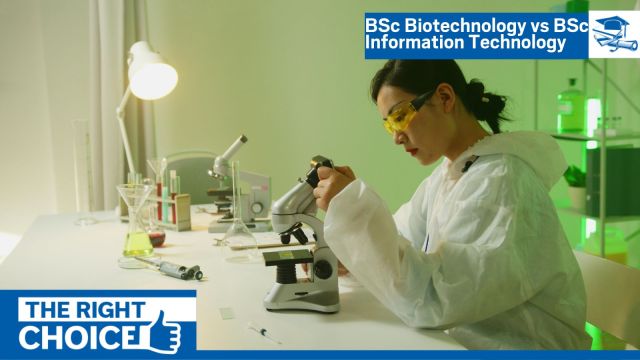© IE Online Media Services Pvt Ltd
Latest Comment
Post Comment
Read Comments
 BSc Biotechnology vs BSc Information Technology: Course curriculum and job prospects (representative image/ Pexels)
BSc Biotechnology vs BSc Information Technology: Course curriculum and job prospects (representative image/ Pexels)(‘The Right Choice’ is a series by The Indian Express that addresses common questions, misconceptions, and doubts surrounding undergraduate admissions. You can read the stories here.)
– A Geetha Bhavani
Technology has become a crucial part of the modern world. Technical fields including biotechnology and information technology play a major role in shaping the future workforce. Nowadays, courses like BSc Biotechnology and BSc Information Technology are increasingly preferred by students as they offer broader career prospects and growth.
Both these course are associated with science and technology but they focus on different subjects and career opportunities. It is essential to understand the difference in curriculum and job opportunities to make a clear academic and career choice.
Biotechnology is a technical field that uses biological systems, organisms, or their derivatives to develop new products for various sectors such as healthcare, agriculture, and industry. BSc Biotechnology is a three-year programme that focuses on hands-on laboratory work and explores topics like genetics, microbiology, molecular biology, and biochemistry.
The academic curriculum of BSc Biotechnology includes major subjects such as cell biology, microbial genetics, microbiology, immunology, plant and animal biotechnology, plant pathology, and bioinformatics. It also involves laboratory techniques such as DNA sequencing, polymerase chain reaction (PCR), DNA cloning, and gel electrophoresis.
Typical job opportunities after pursuing BSc in Biotechnology are microbiologist, biochemist, research scientist, clinical lab technologist, and environmental biotechnologist. Graduates can work in clinical research, genetic engineering, developing bio-fertilizers, and pest-resistant plants. They can also be employed in laboratories as research scientists, lab technicians, or quality control analysts.
Information Technology focuses on computer systems, programming, data management, and network systems. BSc Information Technology is a three-year program that includes technical and applied aspects of computers and software to solve real-world problems and cover topics like programming languages, database management, and information security.
The academic curriculum of B.Sc Information Technology includes Data structures, computer networks, operating systems, and programming languages such as Java, Python, and C++. It also focuses on application development, web development, cyber security, artificial intelligence, cloud computing, and data science.
Job opportunities after pursuing BSc in Information Technology are software developer, network administrator, database administrator, IT consultant, cybersecurity analyst, and data analyst. Individuals can handle software projects, analyze data and information systems, and create applications and websites.
Both BSc in Biotechnology and BSc in Information Technology provide valuable skills and knowledge, but they offer very different career paths. Biotechnology is suitable for those interested in biology, research, and laboratory while Information Technology is ideal for those interested in computer systems and databases. Individuals should choose the field as per their area of interest.
(Dr. A. Geetha Bhavani, Dean School of Sciences, Noida International University)


